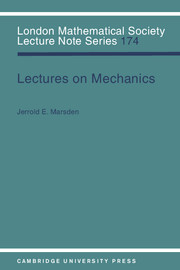Book contents
9 - Mechanical Integrators
Published online by Cambridge University Press: 05 August 2012
Summary
For conservative mechanical systems with symmetry, it is of interest to develop numerical schemes that preserve this symmetry, so that the associated conserved quantities are preserved exactly by the integration process. One would also like the algorithm to preserve either the Hamiltonian or the symplectic structure — one cannot expect to do both in general, as we shall show below. There is some evidence (such as reported by Chanell and Scovel [1990] and Marsden et al. [1991]) that these mechanical integrators perform especially well for long time integrations, in which chaotic dynamics can be expected. It is well known that, in general, may standard algorithms can introduce spurious effects (such as nonexistent chaos) in long integration runs; see, for example, Reinhall, Caughey, and Storti [1989]. We use the general term mechanical integrator for an algorithm that respects one or more of the fundamental properties of being symplectic, preserving energy, or preserving the momentum map.
Definitions and Examples
By an algorithm on a phase space P we mean a collection of maps Fτ: P → P (depending smoothly, say, on τ ∈ ℝ for small τ and z ∈ P). Sometimes we write zk+1 = Fτ(zk) for the algorithm and we write Δt or h for the step size τ.
- Type
- Chapter
- Information
- Lectures on Mechanics , pp. 171 - 188Publisher: Cambridge University PressPrint publication year: 1992



